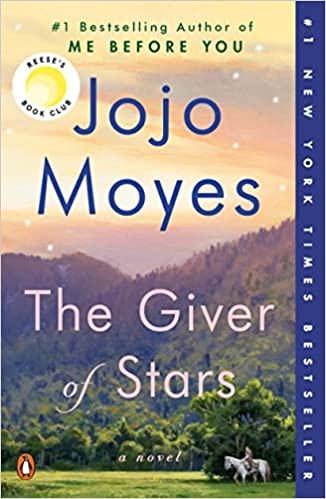The Giver of Stars by Jojo Moyes
Jojo Moyes sets her latest novel, The Giver of Stars (Pamela Dorman Books), in rustic Kentucky during the Depression. At this time, Americans in remote areas had little or no access to books, and many were uneducated. In contrast, our reading habits today are fluid: we peruse library shelves and get on their lists for the newest titles; we order books online with a tap of a finger. Or we select our next reads at an Indie bookstore or a book chain. Others download them electronically on their e-readers. Any of these options makes us realize how dark were the days when an unrequited hunger for information and a yearning for books and stories was all too common.
Against this backdrop, Moyes has created a rich tale. There are impressive, strong-willed women in the town of Baileyville who have volunteered to be the traveling librarians. This group horseback rides through frightful weather across the rugged terrain to deliver books to eager readers. Not only do these women increase literacy, but the books they bring augment people’s lives and offer glimpses of worlds beyond their own backwater existence.
Enter Alice Wright, a young English bride who has married a Kentucky man as a means to leave England and distance herself from her strict, unforgiving family. While marriage to Bennett was a “ticket” to America, Alice had no idea what life would be like once she arrived.
Initially she is in culture shock; living in a coal-mining town is unfathomable. To make matters worse, her marriage fails early on, despite her best efforts.
When the traveling library is in need of volunteers, Alice signs up and discovers a panacea for her unhappiness. Not only is she distracted, but she finds excitement in the challenging journeys and welcomes the rewards of delivering books.
The way the women bond is so vividly portrayed, it is visceral. Among them, Margery O’Hare stands out as an independent spirit. Alice is drawn to her authenticity. Margery doesn’t seek the prescribed roles for women – neither marriage nor family appeals to her. So convinced of her point of view is Margery that she defies those who criticize her mission.
The friendship that the two women develop is a wake up call for Alice, especially when her husband’s unkindness and her father-in-law’s abuse and cruelty accelerate. As owners of the local mine, this father/son duo wield power in broad sweeps.
The travelling library – based on Eleanor Roosevelt’s program to enhance options for those in poor areas through reading and knowledge – emboldens Alice. Because Moyes shows us Alice’s sense of exclusion in the life she left behind, we sense her isolation wherever she turns.
To add to her predicament, there is the price she pays to be an ally of Margery O’Hare. Who can help but cheer for Alice as she gains voice and clarity? And no spoiler here, but the love interests that evolve underscore how these women come to define their destinies.
Beyond very detailed female characters, we encounter “the men.” There are those men who are threatened by books that educate and open minds. Then those who are more enlightened. The battles ensue –judgments, vendettas, corruption, the endurance of miners and their families. And thus we are engrossed in the drama of a gritty, unevolved territory versus the promise of fearless women (no victims here) who transport books to those in need and believe in the community they create.
The Giver of Stars is now available.
Buy this Book!
Amazon


